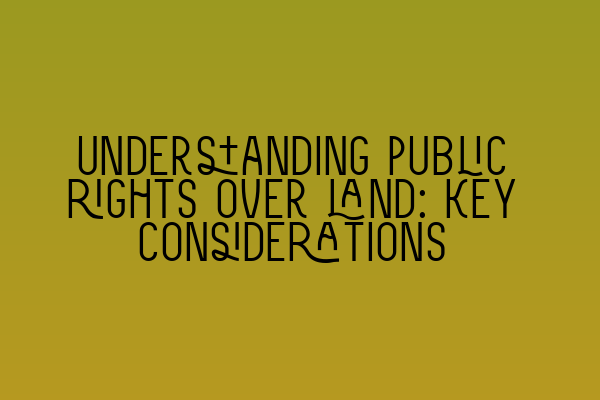Understanding Public Rights Over Land: Key Considerations
As a leading property law firm, SQE Property Law & Land Law is committed to providing our clients with comprehensive advice and guidance on all aspects of property ownership and dispute resolution. In this blog post, we aim to shed light on an often complex area of law – public rights over land.
Public rights over land refer to the various rights that individuals and communities may have to use and access certain pieces of land that are not privately owned. These rights are often established through custom, usage, or legislation, and they play a crucial role in ensuring that public spaces are accessible and enjoyed by all.
Key Considerations for Understanding Public Rights Over Land
1. Types of Public Rights:
There are several types of public rights over land, including:
– Rights of way: These are the rights to cross or use a particular pathway or road on foot, by bicycle, or by vehicle.
– Rights to roam: In some countries, individuals have the right to access certain open spaces such as mountains, moorlands, or common land for recreational purposes.
– Rights to use beaches and seashores: Public access to beaches and seashores is protected in many jurisdictions.
2. Establishing Public Rights:
Public rights over land can be established in various ways:
– Prescriptive rights: These rights are acquired through continuous and uninterrupted use of the land for a significant period of time.
– Easements and covenants: Some public rights may be created through legal agreements or deeds.
– Legislation: Public rights can also be established through acts of legislation passed by the government.
3. Limitations and Restrictions:
While public rights over land are important, they are not absolute. There are certain limitations and restrictions that may apply:
– Private land: Public rights generally do not extend to privately owned land, unless specifically granted or established.
– Reasonable use: Public rights are often subject to the principle of reasonable use, which means that individuals must use the land in a manner that does not interfere with others’ enjoyment of their rights.
– Conservation and protection: Public rights must also coexist with the need to protect and conserve the natural environment and wildlife habitats.
4. Resolving Disputes:
Disputes can sometimes arise between private landowners and members of the public regarding public rights over land. When facing such a dispute, it is essential to seek legal advice to understand your rights and options for resolution.
5. Importance of Legal Advice:
Given the intricacies of public rights over land, it is crucial to consult with a property law expert who can assess your specific situation and provide tailored advice. A professional solicitor can guide you through the legal complexities and help protect your rights.
Conclusion
Understanding public rights over land is key to navigating the intricacies of property ownership and access. Whether you are a private landowner or a member of the public, knowing your rights and obligations is essential for maintaining a harmonious coexistence. If you have any questions or concerns regarding public rights over land, please do not hesitate to contact SQE Property Law & Land Law. Our experienced team is here to assist you every step of the way.
